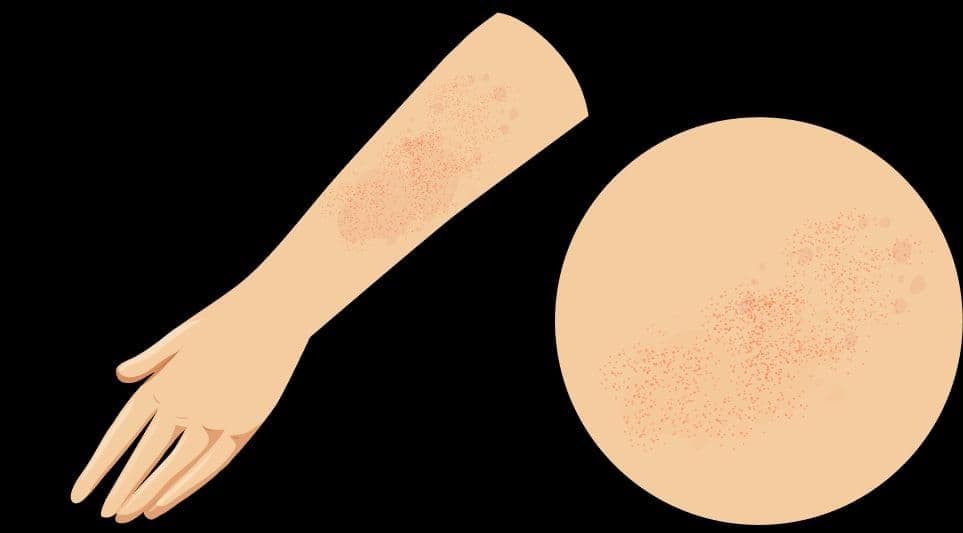This article has been compiled by Vaibhavi Kodnani, a content writer at Proactive For Her.
What is urticaria or hives?
Urticaria or hives are the sudden and rapid appearance of small, itchy swellings on the skin. These can be skin-coloured or reddish. Some of the common symptoms associated with urticaria are:
- Itching
- Burning sensation
- Welts (raised bumps, swellings or lines) on the skin
- Welts can start on one area and spread to different areas of the body
- Rarely, the lips, eyes and throat can also swell (angioedema)
Are hives serious?
Urticaria is harmless and non-contagious. Hives last for a short period and can disappear on their own in a few minutes to a few hours. They usually occur as a consequence of an allergic reaction to some food, medications, infections or irritants. If it becomes a persistent and long standing problem, it can interfere with the quality of your life. Upon your doctor’s recommendation, you may require an antihistamine or an anti-allergic tablet to treat this condition. The treatment will also involve eliminating your trigger factors.
It is rare but urticaria is also associated with a serious condition called angioedema. In this, your lips, eyes, mouth and throat swell up. If your throat swells up and you are unable to breathe properly, seek medical care as soon as possible as this is an emergency. Your medical team may need to give you injections or explore other treatment options depending on how bad the situation is, to prevent the worsening of the symptoms.
What are the types of hives?
Hives can be classified into two types:
Acute hives: When hives are treated and resolved within 6 weeks, they are known as acute hives.
Chronic hives: If the hives persist longer than 6 weeks, it falls under this category. In this scenario, you may need to take medication over a longer period.
What are the causes of hives?
Hives are the result of the body’s immunological response to different allergens. When the body reacts to an allergen, it releases histamine and other chemicals from under the skin surface. These, in turn, lead to inflammation and fluid accumulation under the skin, causing symptoms such as hives.
Allergic reactions: Hives are most commonly caused by allergic reactions due to the intake of certain foods and medications.
- Foods that are known to be common allergens (eggs, shellfish, peanuts, food colouring agents, brinjal, curd, milk)
- Medication (anti-inflammatory, local anesthetic, antibiotics, radio contrast used in CT scan)
However, these are a general list of allergens and can vary from person to person.
Infection-induces hives: Hives can also be caused due to a viral, bacterial or parasitic infection in the body.
Physical urticaria: Hives can occur in response to some physical factors or stimuli including temperature changes such as by extreme heat or extreme cold. Continuous scratching or pressure on the skin may also produce hives. Being in contact with something for a long time or exposure to water or light are known to cause hives too.
Autoimmune urticaria: Rarely, autoimmune disorders like SLE may be associated with urticaria.
Other medical conditions: People with atopic diseases, hay fever have sensitive skin. Hence, they are prone to getting urticaria.
When should you go to a doctor?
If the problem of hives persists for more than 4-5 days or keeps recurring more than once a week, it is recommended you consult a doctor and receive the required medical treatment for it. In case you experience a fever or breathing difficulty along with hives, seek immediate medical attention. Self-diagnosing and self-medicating is not advisable.
How are hives diagnosed?
It is easy to diagnose hives. You can expect the following when you visit your doctor.
History: Your doctor will ask you questions to describe your condition and understand what possibly provoked it. The doctor may also ask you to provide a history of infections, medicines you may be consuming and your food diary. It will help in determining the exact factor that is triggering the hives.
Medical Tests: After recording your history, the doctor may even ask you to do certain tests such as a blood count, thyroid tests, urine and stool test, etc., to narrow down the factors causing hives.
Dermographism: In dermographism, there is an instant occurrence of hives when the doctor scratches the skin of your forearm or back using a pen or any other object.
What is the medical treatment of hives?
The medical treatment of hives is straightforward. It involves a combination of avoiding the trigger factors and taking medications if recommended by the doctor. It is possible to completely cure it, but the treatment period will vary for everyone. It can take from a few weeks to months or even a few years to completely resolve it.
Avoid trigger factors
Once you figure out your trigger factor, you need to eliminate them to prevent hives. If any particular food is your trigger, stop consuming them completely. Likewise, if heat or cold triggers hives for you, avoid using extremely hot or cold water. Wear clothes with full sleeves if you experience pressure-induced hives. In short, avoiding your trigger factors is one of the main steps to cure this condition.
Medications
Antihistamines: Since histamines are the reason behind hives, you may need to take antihistamines. The doctor will advise you on the dosage of the medicine based on the severity of your condition. Many of these medicines are sedatives and can be troubling if given for longer durations. However, non-sedating antihistamines are also available now.
Mast cell stabilizers: Sometimes, in addition to the antihistamines, they may have to prescribe you a second group of medicines such as mast cell inhibitors.
Oral steroids and immunosuppressants: If the hives are persistent and causing discomfort, the doctor may also put you on a short course of oral steroids and immunosuppressants.
Treat underlying conditions
If the hives are associated with any underlying conditions such as infections or thyroid and other diseases, it is crucial to treat them and prevent hives.
What are the home remedies to treat urticaria?
There are no home remedies that can treat this condition. But, a few remedies can help soothe your skin after you get hives.
- If the urticaria is not cold-induced, you can apply ice on your skin to help reduce the itching and calm your skin.
- You can even use topical antipruritic lotions to reduce the swelling, itching, and redness caused by hives.
- You can apply aloe vera gel or calamine lotion to calm the skin and relieve it from itching.
Bottom line
There are no risk factors or causes of urticaria that you can avoid to prevent this condition. If you get hives, it also does not suggest that your immune system is weak. The only solution is to avoid the trigger factors, treat underlying conditions and get on a course of medications after consulting your doctor if it is a recurring problem.
Disclaimer - This information is provided for educational purposes and should not be construed as medical advice. Please consult with your healthcare practitioners before undertaking any changes in your diet or adding supplements.
Proactive For Her is a digital clinic for women, offering accessible, personalized, and confidential healthcare solutions. We offer products and services for out-patient health concerns of Indian women, across their lifetime - from puberty to pregnancy to menopause. To know more on the sexual and reproductive health of women, visit https://www.proactiveforher.com/

